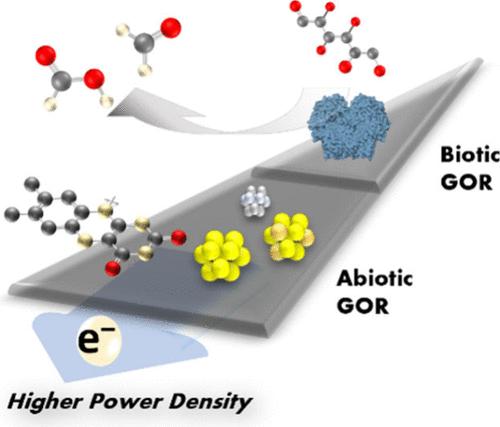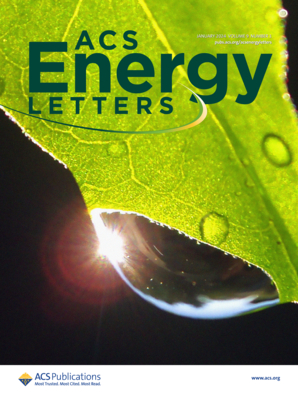维生素介导的葡萄糖流动细胞可持续发电
IF 18.2
1区 材料科学
Q1 CHEMISTRY, PHYSICAL
引用次数: 0
摘要
葡萄糖作为生物燃料具有低温发电、易于获取、储存成本低、适应按需发电等独特优势。核黄素,俗称维生素B2,是生物系统的重要组成部分,作为酶辅助因子参与许多代谢反应。从这些代谢过程中获得灵感,我们展示了一种用于电化学葡萄糖氧化反应(GOR)的流动电池,使用核黄素作为环保介质取代传统的贵金属催化剂。当在碱性条件下与O2电极配对时,葡萄糖流电池的峰值功率密度达到13 mW/cm2,是之前报道的在类似条件下的20倍。所演示的维生素介导的生物燃料液流电池为葡萄糖基生物燃料电池引入了一种新的催化设计方法,在室温和环境压力下提供高峰值功率密度。这种方法确保了低成本和环境可持续性,消除了对贵金属催化剂的需求。本文章由计算机程序翻译,如有差异,请以英文原文为准。

Vitamin-Mediated Glucose Flow Cell for Sustainable Power Generation
Glucose as a biofuel offers unique advantages, including low-temperature electricity generation, easy accessibility, low storage cost, and adaptability for on-demand power generation. Riboflavin, commonly known as Vitamin B2, is a critical component in biological systems, participating in many metabolic reactions as an enzyme cofactor. Drawing inspiration from these metabolic processes, we demonstrate a flow cell for the electrochemical glucose oxidation reaction (GOR), using riboflavin as an environmentally friendly mediator to replace traditional noble metal catalysts. When pairing with an O2 electrode under alkaline conditions, the glucose flow cell achieves a peak power density of 13 mW/cm2, 20 times greater than the previously reported value under similar conditions. The demonstrated vitamin-mediated biofuel flow cell introduces a new catalytic design approach for a glucose-based biofuel cell, delivering high peak power density at room temperature and ambient pressure. This approach ensures low cost and environmental sustainability, eliminating the need for noble metal catalysts.
求助全文
通过发布文献求助,成功后即可免费获取论文全文。
去求助
来源期刊

ACS Energy Letters
Energy-Renewable Energy, Sustainability and the Environment
CiteScore
31.20
自引率
5.00%
发文量
469
审稿时长
1 months
期刊介绍:
ACS Energy Letters is a monthly journal that publishes papers reporting new scientific advances in energy research. The journal focuses on topics that are of interest to scientists working in the fundamental and applied sciences. Rapid publication is a central criterion for acceptance, and the journal is known for its quick publication times, with an average of 4-6 weeks from submission to web publication in As Soon As Publishable format.
ACS Energy Letters is ranked as the number one journal in the Web of Science Electrochemistry category. It also ranks within the top 10 journals for Physical Chemistry, Energy & Fuels, and Nanoscience & Nanotechnology.
The journal offers several types of articles, including Letters, Energy Express, Perspectives, Reviews, Editorials, Viewpoints and Energy Focus. Additionally, authors have the option to submit videos that summarize or support the information presented in a Perspective or Review article, which can be highlighted on the journal's website. ACS Energy Letters is abstracted and indexed in Chemical Abstracts Service/SciFinder, EBSCO-summon, PubMed, Web of Science, Scopus and Portico.
 求助内容:
求助内容: 应助结果提醒方式:
应助结果提醒方式:


